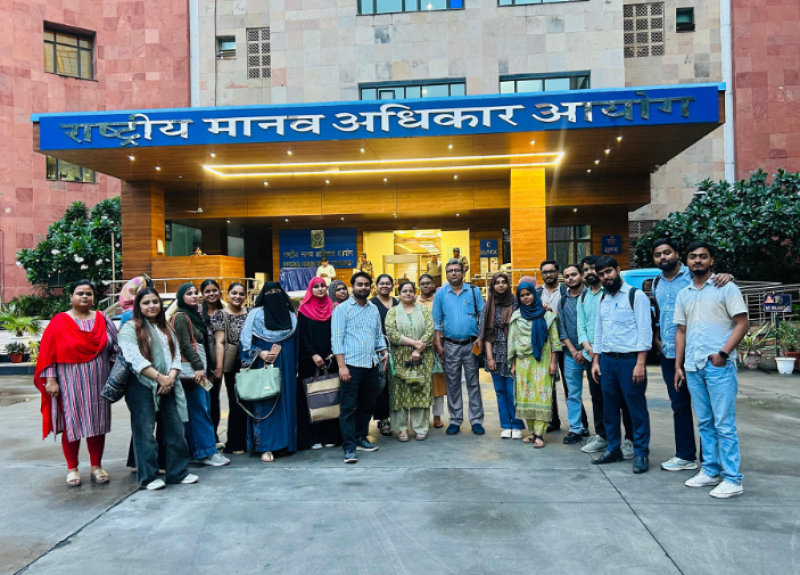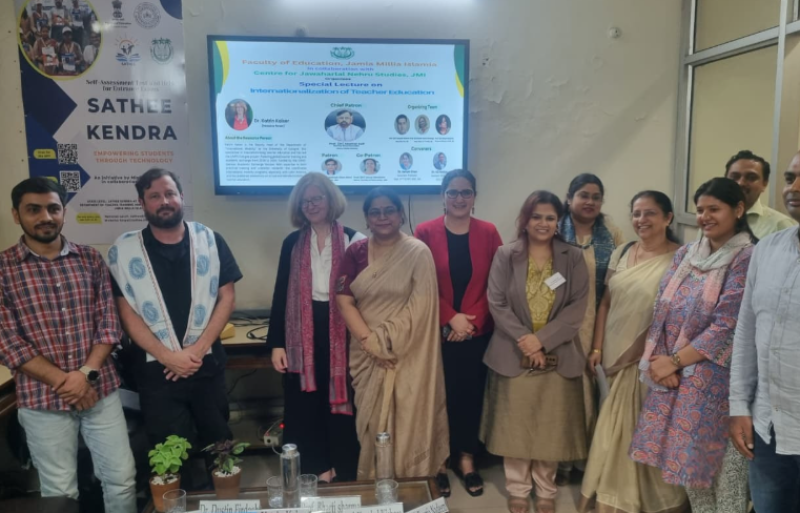The Department of Educational Studies, Faculty of Education, Jamia Millia Islamia, organized an educational visit for 51 students to the National Human Rights Commission (NHRC) on 30th September, 2025. The visit was coordinated by Dr. Md Musa Ali and Dr. Zeba Tabassum, aiming to provide students with practical insights into the functioning of the NHRC and its role in safeguarding human rights in India. The visit proved to be an enriching and informative experience, offering students a deeper understanding of the commission’s operations and processes.
The programme commenced at 2:30 PM with a warm welcome from Ms. Monica Joon, Section Officer, Training Division, NHRC. The visit consisted of four engaging sessions, concluding around 6:00 PM. Each session was designed to cover distinct aspects of the NHRC’s operations, providing a comprehensive overview of its structure, complaint handling mechanisms and investigative processes.
The first session was delivered by Lt. Col. Virendra Singh, Director, NHRC. He provided an in-depth overview of the commission’s establishment and legal framework. The NHRC was established on 12th October, 1993, under the Protection of Human Rights Act (PHRA), 1993, as amended by the Protection of Human Rights (Amendment) Act, 2006. Lt. Col. Singh explained that the commission comprises a Chairperson, five full-time Members, and seven deemed Members, with specific qualifications outlined in the statute for their appointment. This session offered students a foundational understanding of the NHRC’s structure and mandate.
The second session was conducted by Mr. Anjanee Anuj, Presenting Officer, NHRC. He elaborated on the cycle of complaints, detailing the entire process of receiving, processing, and responding to complaints lodged with the NHRC. This session provided valuable insights into the procedural aspects of addressing human rights violations, highlighting the commission’s commitment to ensuring justice and accountability.
Mr. Amit Kumar Sharma, System Analyst, NHRC, led the third session, demonstrating the process of filing an online complaint on the NHRC portal. He explained how victims or individuals acting on their behalf can submit complaints through the digital platform. This hands-on demonstration equipped students with practical knowledge of accessing NHRC services, emphasizing the role of technology in enhancing accessibility.
The final session was presented by Mr. Isam Singh, Deputy Superintendent of Police, NHRC. He provided a detailed explanation of the investigation process at the ground level, shedding light on how the NHRC conducts inquiries into human rights violations. This session was particularly engaging, offering students a glimpse into the practical challenges and methodologies involved in fieldwork and investigations.
The educational visit to the NHRC was highly enriching, interesting, and informative for the students. The sessions provided a holistic understanding of the commission’s role in protecting and promoting human rights in India. Students gained insights into the legal framework, complaint mechanisms, and investigative processes, which will be immensely beneficial for their academic and professional development. The interactive nature of the sessions fostered critical thinking and a deeper appreciation for the importance of human rights advocacy.
The visit to the National Human Rights Commission, organized by the Department of Educational Studies, Jamia Millia Islamia, was a resounding success. The well-structured sessions, expert presentations, and practical demonstrations offered students a unique opportunity to connect theoretical knowledge with real-world applications. This experience will undoubtedly inspire students to engage more actively with issues of human rights and contribute meaningfully to society in their future endeavors.


.jpg)